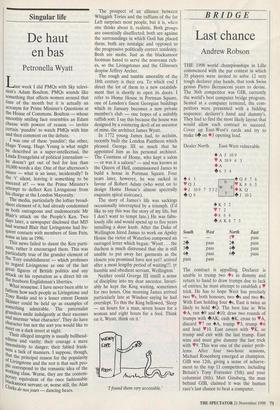Singular life
De haut en bas
Petronella Wyatt
Last week I did PMQs with Sky televi- sion's Adam Boulton. PMQs sounds like something that affects women around that time of the month but it is actually an acronym for Prime Minister's Questions at the House of Commons. Boulton — whose smoothly smiling face resembles an Edam cheese with powers of reason — invites certain 'pundits' to watch PMQs with him and then comment on the debate.
I was one of these 'pundits% the other, Hugo Young. Hugo Young is what might be described as a super-intellectual, the Linda Evangelista of political journalism he doesn't get out of bed for less than 10,000 words a day. One of that afternoon's issues — what is an issue, incidentally? Is the 't' silent, leaving it something to be sneezed at? — was the Prime Minister's attempt to deflect Ken Livingstone from his charge at the London Mayoralty. The media, particularly the loftier broad- sheet element of it, had already condemned as both outrageous and undemocratic Mr Blair's attack on the People's Ken. Two days later, a newspaper disclosed that MI5 had warned Blair that Livingstone had fre- quent contacts with members of Sinn Fein, some as late as 1996.
This news failed to daunt the Ken parti- sans, rather it encouraged them. This was Particularly true of the grander element of the Tory establishment — which professes to regard Livingstone as one of the last great figures of British politics and any attack on his reputation as a direct hit on the freeborn Englishman's liberties. What nonsense. I have never been able to fathom how such people as Livingstone and Tony ony Banks and to a lesser extent Dennis Skinner could be held up as examples of something admirable. The paternalist grandees smile indulgently at their excesses and murmur 'what character'. They do have character but not the sort you would like to Meet on a dark street at night. ,Thelr alleged integrity is usually bullhead- e. uric% and vanity; their courage a mere Insensitivity to danger; their fabled frank- ness a lack of manners. I suppose, though, Itlat .the principal reason for the popularitY u! Livingstone and the rest is that such peo- _ie correspond to the romantic idea of the wcIrking class. Worse, they are the contem- rratY equivalent of the once fashionable Clarks servant; or, worse still, the Alan t] arks de nos jours — dancing bears. The prospect of an alliance between Whiggish Tories and the ruffians of the far Left surprises most people, but it is, when one thinks about it, realistic. Both groups are essentially disaffected; both are against the surroundings in which God has placed them; both are nostalgic and opposed to the progressive politically correct tendency. Both are snobs. Just as the blackamoor footman hated to serve the nouveaux rich- es, so the Livingstones and the Gilmours despise Jeffrey Archer.
The rough and tumble amorality of the 18th century is their era. To which end I direct the lot of them to a new establish- ment that is shortly to open its doors. I refer to Home House in Portman Square, one of London's finest Georgian buildings which in January becomes a new private member's club — one hopes of a suitably raffish sort. I say this because the house was designed by a roistering devil of an ancestor of mine, the architect James Wyatt.
In 1772 young James had, to acclaim, recently built the London Pantheon which pleased George III so much that he appointed him as his personal architect. The Countess of Home, who kept a salon — or was it a saloon? — and was known as the Queen of Hell, commissioned James to build a house in Portman Square. Four years later, however, he was sacked in favour of Robert Adam (who went on to design Home House's almost spectrally exquisite spiral staircase).
The story of James's life was sackings occasionally interrupted by a triumph. (I'd like to say this was the story of my life, but I don't want to tempt fate.) He was fabu- lously idle and would spend up to five years installing a door knob. After the Duke of Wellington hired James to work on Apsley House the victor of Waterloo composed an outraged letter which began: 'Wyatt ... the duchess is much distressed that she is still unable to put away her garments as the closets you promised have not yet!! arrived after a most lengthy period of waiting!!!. yr humble and obedient servant, Wellington.'
Neither could George III instill a sense of discipline into my dear ancestor. Invari- ably he kept the King waiting, sometimes for two hours. One morning James arrived particularly late at Windsor saying he had overslept. To this the King bellowed, 'Sleep — six hours for a man, seven hours for a woman and eight hours for a fool. Think on it, Wyatt, think on it.'
`I found them very accessible.'


















































































 Previous page
Previous page